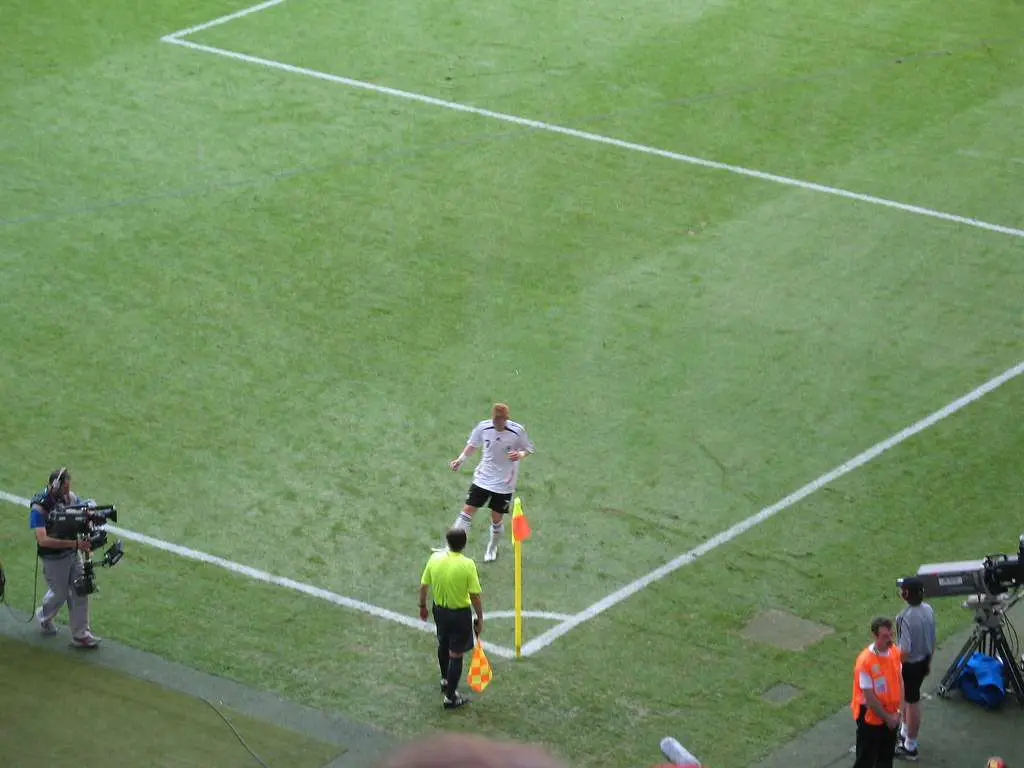“He is not a great player,” scorned English pundit Paul Merson. It was November 2015, and the former Arsenal player was talking on Sky Sports’ Soccer Saturday.
“In 30 years’ time, we won’t be talking about Schweinsteiger; we will be talking about Cruyff, Platini, Beckenbauer, people like that.”
Plenty would disagree. Bastian Schweinsteiger enjoyed a trophy-laden playing career which included eight Bundesliga titles, a World Cup and a UEFA Champions League title. At the end of the 35-year old’s career, it seems appropriate to take a retrospective view of the playing days of the midfielder affectionately known as “Schweini” by German fans.
Bastian Schweinsteiger was born in Kolbermoor, a small Bavarian town close to the Austrian border. He joined Bayern Munich’s youth academy in 1998, and it was during this period that Schweinsteiger abandoned a promising ski career in order to primarily focus on football.
Impressive displays for the reserve side led Schweinsteiger to the first team, and he made his professional debut in 2002 at the age of 18. In that season, the German earned his first Bundesliga and DFB Pokal medals as Bayern Munich won the league and cup double.
However, it was in the following season that the player established himself as a regular in the Bayern side. Schweinsteiger played in 33 first team matches across competitions. Despite the side relinquishing the league and cup titles to Werder Bremen, Schweinsteiger sufficiently impressed to be included in the Germany Euro 2004 squad.
While the tournament was a disaster for die Mannschaft, the emergence of the likes of Schweinsteiger and close friend Lukas Podolski was a cause for optimism in an otherwise dark period of time for German football.
With the atrocious showing at the European Championship, there was a real anxiety that Germany would embarrass themselves under the spotlight as hosts of the 2006 World Cup. By this stage, Schweinsteiger had become a key player for club and country, as the tournament followed a second successive title for Bayern. The country’s fears were unfounded, as the Germany side under Jürgen Klinsmann gained plenty of admirers, playing an attractive brand of football on their way to an unexpected third-place finish.
It was perhaps during this tournament that Schweinsteiger gained international recognition, being one of the team’s shining lights while deployed in a left midfield role. His most memorable performance came in the third-place play-off, with two long-range strikes and a deflected free-kick effectively singlehandedly defeating Portugal 3-1.
Euro 2008 was more of a mixed bag for Bastian Schweinsteiger, as he started the tournament on the bench and was sent off after coming on in the group match against Croatia. However, Schweinsteiger’s re-inclusion in the knockout stages helped the side reach the final, as he scored in successive rounds against Portugal and Turkey.
It was during this period that Bayern were relatively weak, as they lost the 2009 title to Wolfsburg. Schweinsteiger himself seemed to stagnate, as he lacked the speed and dribbling ability to fully develop as a world class winger.
When Louis van Gaal arrived as coach in 2009, he found the solution. Schweinsteiger was reinvented as deep-lying central midfielder, where he could use his passing ability and football intelligence to full effect. Bastian’s adeptness in this position was no more apparent than at the 2010 World Cup, where he made a series of memorable performances and was included in the team of the tournament.
It was at this point and in the intervening years that Schweinsteiger enjoyed the peak of his career, although this period wasn’t without its disappointment, namely in 2012. Borussia Dortmund secured their second Bundesliga crown in a row and added insult to injury by winning the DFB Pokal Final 5-2 against Bayern only weeks later.
Bayern had the chance to remedy this failure with a Champions League Final on their own patch against Chelsea. They had already lost to Inter two years previously at the same stage, but victory this time was expected at the Allianz Arena. Yet more heartbreak was to come, particularly for Schweinsteiger. In a match they dominated, Bayern lost on penalties, with Schweinsteiger inconsolable as he missed the decisive kick before Drogba’s winner. More heartache was to follow that summer, as Germany came up short yet again in the semi-finals of Euro 2012.
It is to Schweinsteiger’s credit that he bounced back along with his club and national sides. He played a key role in Bayern claiming the treble. They snatched back domestic power with the league and cup titles, and Schweinsteiger was finally able to win the elusive UEFA Champions League crown in his third final. This was made all the sweeter as it was domestic rivals Borussia Dortmund they defeated.
Schweinsteiger further avenged previous failures during the 2014 FIFA World Cup in Brazil. He was instrumental in midfield throughout the tournament, with Schweinsteiger’s heroic display in the winning final against Argentina a particular highlight. One of the most memorable images of Schweinsteiger’s career was him celebrating with the World Cup trophy with the cut below his right eye serving evidence of his effort and battling qualities on the pitch.
This World Cup victory seemed like the zenith of Bastian Schweinsteiger’s career and the culmination of the rebuild job of the German national team which had been in process following that disastrous Euro 2004 campaign. Schweinsteiger, along with the likes of Lahm and Podolski, had been instrumental through the transformation of the Germany side from tournament flops to world champions.
For this reason, Schweinsteiger holds a great deal of popularity throughout the country from supporters of Bayern Munich and other clubs alike. This was clearly evident with the standing ovation the player received during his final international match against Finland in 2016, his reception seeming to confirm his legendary status. All in all, he was Germany’s fourth-most capped player with 121 appearances and seven international tournaments under his belt.
In all honesty, Bastian’s career never hit the same heights following that 2010 to 2014 peak. Seemingly unfavoured by new coach Pep Guardiola, Schweinsteiger left Bayern in 2015 after 500 appearances. He struggled to make an impact at Manchester United largely due to injury problems and a strained relationship with Jose Mourinho, although he did experience FA Cup success.
The midfielder, such was his love for Bayern, was unwilling to return to Germany to play for another Bundesliga side. Consequently, after leaving England he spent the remainder of his career in the MLS with Chicago Fire.
It seems unquestionable that Bastian Schweinsteiger had a stellar career, especially with his exploits for Bayern Munich and Germany. There is no coincidence that following his departure from the national team, the side have struggled to maintain previous success. The absence of figures such as Schweinsteiger and Philipp Lahm has created a void in terms of leadership among the playing staff and both were greatly missed as Germany failed to progress beyond the 2018 World Cup group stage.
Even Bayern, for all of their continued domestic success, still miss Schweinsteiger as a man the fans could identify with as a fellow Bavarian.
The quotes when Schweinsteiger retired from former managers sum up his reputation in footballing circles. Former coach Jupp Heynckes said “he was a model for his teammates, is a model for young people” and that “Bastian was always someone who took the lead”. This may bring speculation that Schweinsteiger could enter coaching down the line, but for now he enters TV punditry with ARD Sportschau.
Joachim Löw had the greatest praise for his former player, stating, “He is one of the greatest players in German history”, which seems to directly contradict the thoughts of Paul Merson. On the basis of these quotes, it seems that Merson is very much in the minority with his viewpoint.
Opinions aside, Bastian Schweinsteiger’s honours rather spoke for themselves, and that will be his legacy as the curtain falls on the career of a German football great. In 30 years’ time, Schweinsteiger will not be forgotten. Rather, he will still be celebrated for what he was- a world champion.
By Colin Moore.










